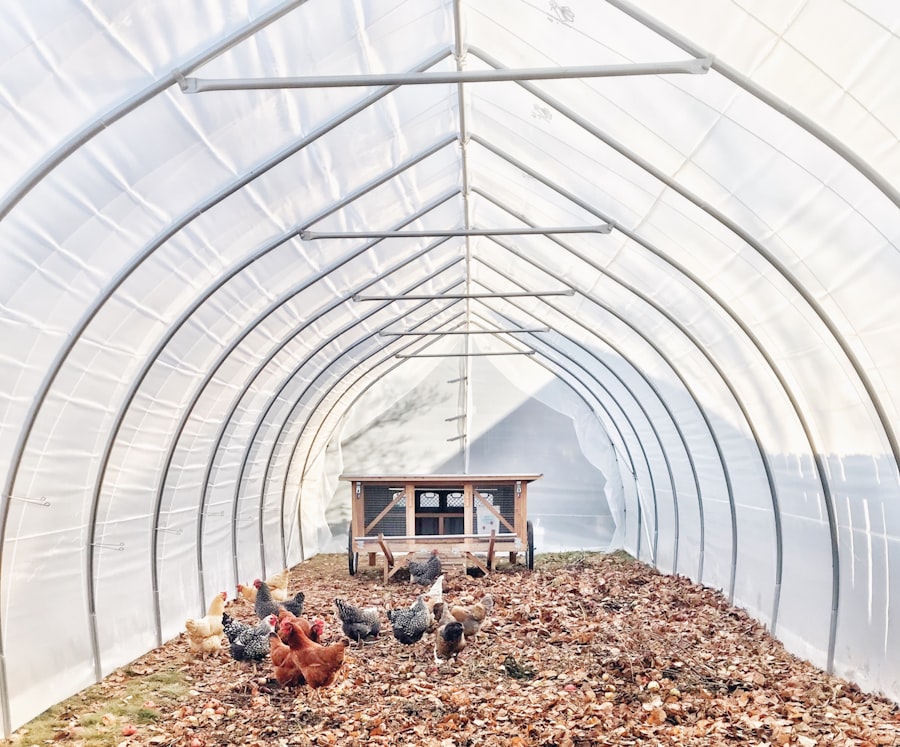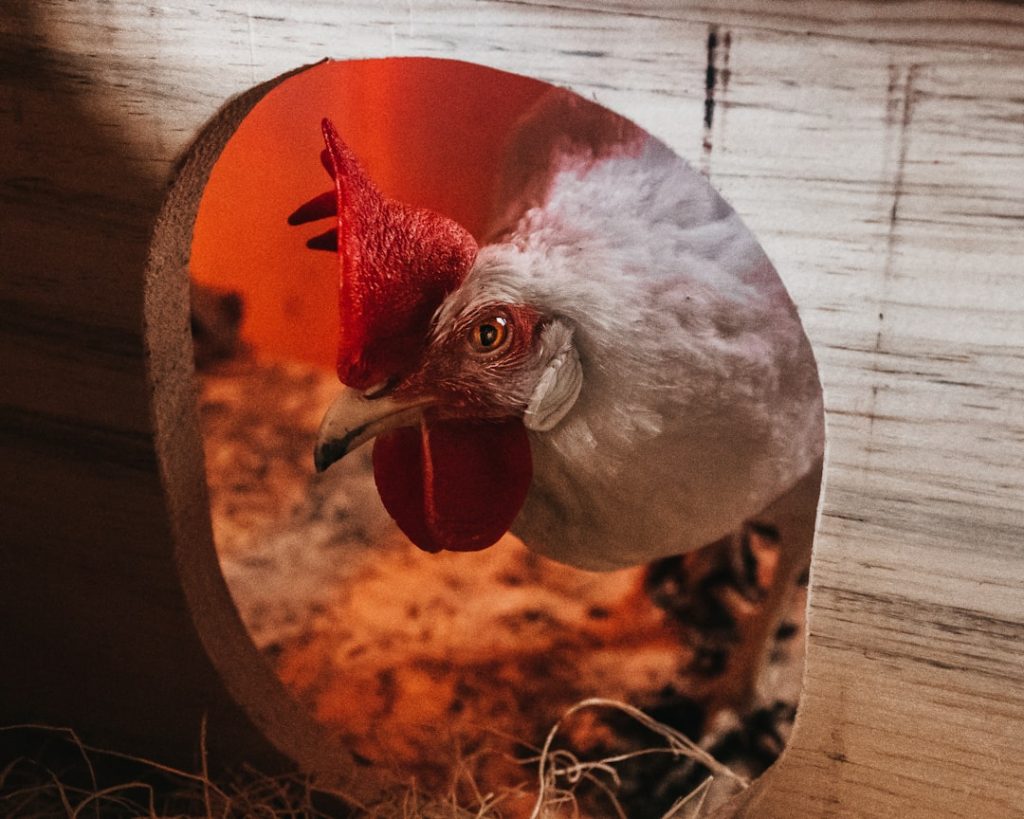Chickens are social creatures that thrive in flocks. They possess innate instincts to forage, explore, and establish hierarchies within their group. These natural behaviors are essential to consider when keeping chickens in a residential setting to prevent them from wandering into neighboring properties.
Chickens are inherently curious and can be drawn to novel stimuli, including sights, sounds, and scents. Consequently, if a neighbor’s yard contains intriguing elements, it may attract the chickens’ attention and encourage exploration. Chickens are also creatures of habit and can experience stress when their routines are disrupted, potentially leading to escape attempts in search of familiar environments.
Additionally, chickens exhibit territorial behavior and may defend their space if they perceive a threat. This territorial instinct can result in conflicts with other animals or neighbors if the chickens venture onto adjacent properties. Understanding these natural behaviors is crucial for chicken owners to anticipate potential issues and implement preventive measures.
By addressing the chickens’ instinctual needs and providing a suitable environment, owners can help ensure their flock remains content within designated areas and minimize the likelihood of wandering or conflicts with neighbors.
Table of Contents
- 1 Creating a barrier between your yard and the neighbor’s yard
- 2 Providing enough space and entertainment in your own yard
- 3 Training your chickens to stay in your yard
- 4 Using deterrents to keep chickens out of the neighbor’s yard
- 5 Communicating with your neighbors
- 6 Seeking professional help if necessary
- 7 FAQs
- 7.1 What are some effective ways to keep chickens from going into neighbors yard?
- 7.2 Are there any legal considerations when it comes to keeping chickens out of neighbors yard?
- 7.3 How can I train my chickens to stay in my yard?
- 7.4 What are the potential consequences of chickens going into neighbors yard?
- 7.5 Are there any natural deterrents to keep chickens from going into neighbors yard?
Key Takeaways
- Chickens have natural behaviors such as scratching, dust bathing, and foraging that should be understood and accommodated in their environment.
- Creating a physical barrier such as a fence or hedge can help prevent chickens from wandering into the neighbor’s yard.
- Providing ample space, perches, and toys can keep chickens entertained and less likely to venture into the neighbor’s yard.
- Training techniques such as positive reinforcement and using treats can help teach chickens to stay within the boundaries of your yard.
- Using deterrents such as motion-activated sprinklers or natural repellents can discourage chickens from entering the neighbor’s yard.
- Open communication with neighbors about your chickens and addressing any concerns they may have can help maintain a positive relationship.
- Seeking advice from a professional animal behaviorist or chicken expert can provide additional support in managing chicken behavior and interactions with neighbors.
Creating a barrier between your yard and the neighbor’s yard
Physical Barriers: The First Line of Defense
One of the most effective ways to keep your chickens in your yard and out of your neighbor’s yard is to create a physical barrier between the two spaces. This can be achieved by installing a sturdy fence that is tall enough to prevent the chickens from flying or jumping over it. Additionally, it’s important to ensure that the fence extends underground to prevent the chickens from digging underneath it.
Secure Enclosures: A Controlled Environment
Another option is to use chicken wire or mesh to create a secure enclosure for your chickens within your yard. This can help prevent them from wandering into your neighbor’s yard while still allowing them to roam and forage in a controlled environment.
Yard Layout and Attraction Management
In addition to physical barriers, it’s important to consider the layout of your yard and the placement of any potential attractions that may draw your chickens towards the neighbor’s yard. For example, if your neighbor has a compost pile or a vegetable garden that may be appealing to your chickens, consider repositioning your chicken coop or creating a designated foraging area within your own yard to redirect their attention.
Providing enough space and entertainment in your own yard

To prevent your chickens from wandering into your neighbor’s yard, it’s important to ensure that they have enough space and entertainment within your own yard. Chickens are naturally curious and active animals, and they require plenty of room to roam, scratch, and explore. By providing a spacious and enriching environment for your chickens, you can help keep them content and less likely to seek out new territories beyond your yard.
One way to provide entertainment for your chickens is to create a designated foraging area within your yard. This can be achieved by scattering food, such as grains or mealworms, in a specific area for the chickens to search for and peck at. You can also introduce natural elements such as logs, branches, or dust baths to encourage natural behaviors and keep your chickens engaged.
Additionally, providing perches or platforms within their enclosure can give them opportunities to roost and observe their surroundings, which can help prevent boredom and reduce the likelihood of them seeking out new environments. It’s also important to consider the overall layout of your yard and the placement of the chicken coop. Ensure that the coop is situated in a central location within the yard, with easy access to food, water, and shelter.
By providing a well-designed and stimulating environment for your chickens, you can help keep them happy and content within their own space.
Training your chickens to stay in your yard
Training your chickens to stay in your yard can be an effective way to prevent them from wandering into your neighbor’s yard. Chickens are intelligent animals that can be trained through positive reinforcement and consistent training methods. One approach is to use treats such as mealworms or sunflower seeds to reward the chickens for staying within their designated area.
Whenever they remain in the yard, offer them a treat as a reward for good behavior. Over time, they will learn to associate staying in the yard with receiving a reward, which can help reinforce this desired behavior. Another training method is to use visual or auditory cues to signal to the chickens when they are approaching the boundary of their designated area.
This can be achieved by placing visual markers such as flags or reflective tape along the perimeter of the yard, or by using sound cues such as a bell or whistle to alert the chickens when they are getting too close to the edge of their space. By consistently using these cues during training sessions, you can help teach the chickens to recognize and respect the boundaries of their environment. Consistency is key when training chickens, so it’s important to be patient and persistent with your training efforts.
By using positive reinforcement and clear cues, you can help teach your chickens to stay within their designated area and reduce the likelihood of them wandering into your neighbor’s yard.
Using deterrents to keep chickens out of the neighbor’s yard
In addition to training your chickens, using deterrents can be an effective way to keep them out of your neighbor’s yard. There are several methods that can be used as deterrents, including visual, auditory, and scent-based options. Visual deterrents such as scarecrows or reflective tape can be placed along the perimeter of your yard to discourage the chickens from venturing beyond their designated area.
These visual cues can help create a clear boundary for the chickens and deter them from crossing into your neighbor’s yard. Auditory deterrents such as motion-activated alarms or ultrasonic devices can also be used to startle the chickens if they approach the edge of their space. These devices emit a loud noise or high-pitched sound when triggered, which can help deter the chickens from venturing further into areas where they shouldn’t be.
Scent-based deterrents such as citrus peels or predator urine can also be effective at keeping chickens out of unwanted areas. These scents are unappealing to chickens and can help discourage them from crossing into your neighbor’s yard. By using a combination of these deterrent methods, you can help reinforce the boundaries of your yard and prevent your chickens from wandering into areas where they shouldn’t be.
Communicating with your neighbors

Transparency and Proactive Measures
When keeping chickens in your yard, it’s crucial to maintain open communication with your neighbors to prevent potential conflicts. Informing them about your chickens and the measures you’re taking to keep them contained within your own space can help alleviate concerns and misunderstandings. By being transparent about your efforts, you can demonstrate your commitment to being a responsible chicken owner.
Addressing Concerns and Building Trust
In addition to keeping your neighbors informed, it’s essential to listen to their concerns and address them proactively. If there are specific areas of their yard that the chickens seem drawn to, consider implementing additional measures such as extra fencing or deterrents in those areas. By working together with your neighbors, you can ensure that everyone is on the same page and that any potential issues are addressed before they escalate.
Fostering Positive Relationships
Maintaining open lines of communication with your neighbors can help build a sense of trust and cooperation, which can be beneficial if any issues arise in the future. By being proactive in addressing concerns and keeping the lines of communication open, you can foster positive relationships with your neighbors and prevent potential conflicts related to your chickens.
Seeking professional help if necessary
If despite all efforts, you find that keeping your chickens in your yard and out of your neighbor’s yard is still a challenge, it may be necessary to seek professional help. There are professionals who specialize in animal behavior and training who can provide guidance on how to effectively manage chicken behavior and prevent them from wandering into unwanted areas. Additionally, consulting with a professional animal behaviorist or trainer can provide valuable insights into understanding chicken behavior and implementing effective training methods.
They can offer personalized advice tailored to your specific situation and provide support in developing a comprehensive plan for keeping your chickens contained within their designated area. In some cases, it may also be beneficial to seek legal advice if conflicts with neighbors arise due to issues related to chicken behavior. A legal professional can provide guidance on local ordinances and regulations related to keeping chickens on residential properties, as well as offer support in resolving any disputes that may arise with neighbors.
Ultimately, seeking professional help when necessary can provide valuable support in addressing any challenges related to keeping chickens in your yard and maintaining positive relationships with neighbors. By leveraging the expertise of professionals in animal behavior, training, and legal matters, you can work towards finding effective solutions that benefit both you and your neighbors. In conclusion, understanding chicken behavior, creating barriers between yards, providing enough space and entertainment within your own yard, training chickens, using deterrents, communicating with neighbors, and seeking professional help if necessary are all important aspects of keeping chickens in your own yard and out of the neighbor’s yard.
By taking proactive measures and being mindful of the needs of both your chickens and neighbors, you can help ensure that everyone coexists harmoniously while maintaining a safe and happy environment for all involved.
If you’re looking for tips on how to keep your chickens from wandering into your neighbor’s yard, you might find this article on chicken coop maintenance helpful. It offers advice on how to secure your coop and keep your chickens contained within your property.
FAQs
What are some effective ways to keep chickens from going into neighbors yard?
Some effective ways to keep chickens from going into neighbors yard include building a fence around your property, using chicken wire or netting to create a barrier, and providing enough space and enrichment in your own yard to discourage them from wandering.
Are there any legal considerations when it comes to keeping chickens out of neighbors yard?
Yes, there may be legal considerations when it comes to keeping chickens out of neighbors yard. It’s important to check local ordinances and regulations regarding the keeping of chickens and property boundaries.
How can I train my chickens to stay in my yard?
You can train your chickens to stay in your yard by providing them with a secure and comfortable coop, ensuring they have enough space and enrichment in your yard, and using positive reinforcement techniques to encourage them to stay within the designated area.
What are the potential consequences of chickens going into neighbors yard?
The potential consequences of chickens going into neighbors yard may include damage to the neighbor’s property, conflicts with neighbors, and potential legal issues if local ordinances or regulations are violated.
Are there any natural deterrents to keep chickens from going into neighbors yard?
Some natural deterrents to keep chickens from going into neighbors yard include planting certain types of vegetation that chickens dislike, using natural scents or repellents, and providing distractions or attractions within your own yard to keep the chickens occupied.
Meet Walter, the feathered-friend fanatic of Florida! Nestled in the sunshine state, Walter struts through life with his feathered companions, clucking his way to happiness. With a coop that’s fancier than a five-star hotel, he’s the Don Juan of the chicken world. When he’s not teaching his hens to do the cha-cha, you’ll find him in a heated debate with his prized rooster, Sir Clucks-a-Lot. Walter’s poultry passion is no yolk; he’s the sunny-side-up guy you never knew you needed in your flock of friends!







